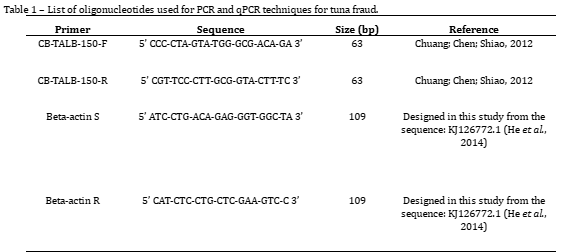Fraud detection on canned tuna marketed in Brazil
DOI:
https://doi.org/10.21708/avb.2024.18.3.11967Abstract
Tuna provides a healthy diet, it’s rich on omega 3, high biologic value proteins, vitamins, and other nutrientes. The most popular presentation is in cans. Due to the fish’s high price however, frauds were reported taking advantage over other species with similar taste but lower cost on fish used for this purpose, reducing production cost, a commonly fact observed in tuna cans. Use of species not declared in the product label implies on fraud. Nowadays Brazilian legislation forecasts detection of fraud in food by molecular analysis in routine inspection. Thus, the study aimed to detect economic fraud through species substitution in canned tuna by means of conventional PCR technique associated with real-time PCR (qPCR). Among 47 analyzed samples merely 7 (14,89%) contained only tuna, 9 had low and 25 had high concentration of another fish, and 7 did not amplified tuna’s DNA, meaning there weren’t any tuna. The results show that economic fraud via non declared species exists with high percentage, showing that is important to install survaillance active, once consummer is being mistaking and this practice is crime according to Brazilian legislation. Another point is that qPCR technique can be used to detect this kind of crime, which present high sensitivity, specificity, fast execution and low cost.
Downloads

Downloads
Published
Issue
Section
License
Copyright (c) 2024 Acta Veterinaria Brasilica

This work is licensed under a Creative Commons Attribution 4.0 International License.
Autores que publicam na Acta Veterinaria Brasilica concordam com os seguintes termos: a) Autores mantém os direitos autorais e concedem à revista o direito de primeira publicação, com o trabalho simultaneamente licenciado sob a Licença Creative Commons Attribution que permite o compartilhamento do trabalho com reconhecimento da autoria e publicação inicial nesta revista. b) Autores têm autorização para assumir contratos adicionais separadamente, para distribuição não-exclusiva da versão do trabalho publicada nesta revista (ex.: publicar em repositório institucional ou como capítulo de livro), com reconhecimento de autoria e publicação inicial nesta revista. c) Autores têm permissão e são estimulados a publicar e distribuir seu trabalho online (ex.: em repositórios institucionais ou na sua página pessoal) a qualquer ponto antes ou durante o processo editorial, já que isso pode gerar alterações produtivas, bem como aumentar o impacto e a citação do trabalho publicado (Veja O Efeito do Acesso Livre).


 Esta obra está licenciada com uma Licença
Esta obra está licenciada com uma Licença 